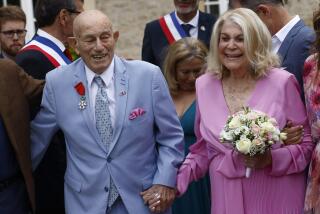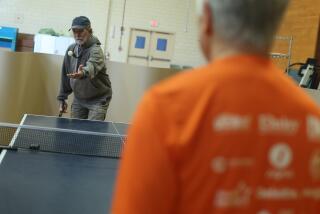Military Widows Carry On in Group to Regroup
- Share via
They get together each month over drinks and dinner, these women of a certain age, and talk about the predictable things.
Jobs. Retirement. Grandchildren. Ailments.
The husbands who never came back.
For Carol Ellinger, that was Staff Sgt. Frank Ellinger USMC, killed in 1968 barely two months after the start of his second tour in Vietnam.
He was 27, and so was she. They were just starting out, a military family in the military town of Oceanside. They had two sons, 4 and 6. Telling the kids was the hardest part.
“It was very, very difficult,” Ellinger said.
And so it was for the other women in Gold Star Wives, whose local chapter Ellinger heads.
Gold Star Wives is not a club anyone would set out to join. The one qualification for membership is that your spouse died on active duty, or from a service-related injury. Fourteen thousand women belong, including about 70 locally.
It is a particular anguish that brings the Gold Star Wives together month after month, but they don’t go in for grief never-ending.
“We do talk about our husbands,” said Ellinger, an ex-Marine herself, “but we accept the reality of it.”
She and I were talking during a break in her classroom at Fremont Intermediate School in Oxnard, where she teaches students with learning disabilities. A calendar displayed a photo of the Iwo Jima monument in Washington; a poster read: “Show Your Colors, America--Fly Your Flag Daily!”
At 58, Ellinger recalls the desperate loneliness she felt after her husband drowned during a skirmish on a river in Quang Tri province. Everyone knows how tough Vietnam veterans had it when they came home. Few know how tough it was for the widows of the men who didn’t come home at all.
“There was no support for the Vietnam widow,” she said. “There was no one to talk to.”
She finally found two other Vietnam widows--one with six kids, and the other pregnant. The three women hauled their kids to Disneyland, went on picnics, talked till late in the night--and revived a dormant Gold Star Wives chapter.
The organization was founded just after World War II. Gold stars were well-known then; they hung in tens of thousands of windows across America, in homes to which men wouldn’t be returning.
Ellinger moved to Ventura County in the mid-1970s. Her first effort to start a group here fizzled--only one woman, a World War II widow named Bobbi, showed up for lunch--but a second try took off in 1985.
“It was a time of crisis for military widows,” Ellinger said. “The government was taking away many of our benefits.”
In fact, most of the group’s monthly meeting isn’t fond remembrance but sharp commentary on regressive legislation and tightfisted bureaucrats. A lobbyist works Congress for the Gold Star Wives, and a quarterly newsletter urges members to keep those letters and e-mails coming.
They’re pushing hard to restore pensions to military widows who remarry. And for giving them low-cost health care on military bases. And for extending their educational benefits over a lifetime, instead of limiting them to 10 years.
The Channel Islands chapter meets at restaurants in Ventura and Santa Barbara, alternating each month for the benefit of older women who no longer drive the freeways. New members get a quick around-the-table summary of how each husband died; the rest of the evening is taken up with wisecracks from the grandkids, plans for Veterans Day observances, outrages from the government.
“We get on with the business of living,” Ellinger said.
Steve Chawkins can be reached at 653-7561 or by e-mail at steve.chawkins@latimes.com.
More to Read
Inside the business of entertainment
The Wide Shot brings you news, analysis and insights on everything from streaming wars to production — and what it all means for the future.
You may occasionally receive promotional content from the Los Angeles Times.











